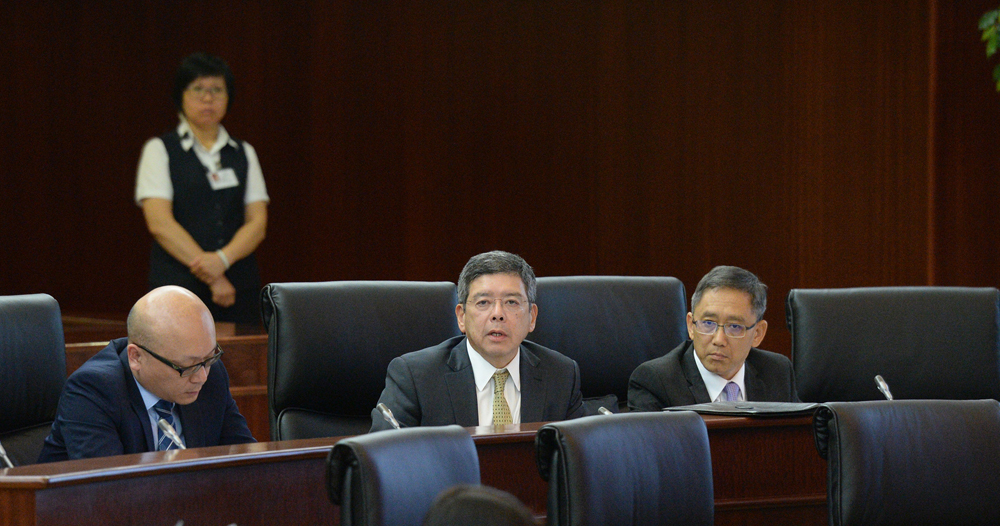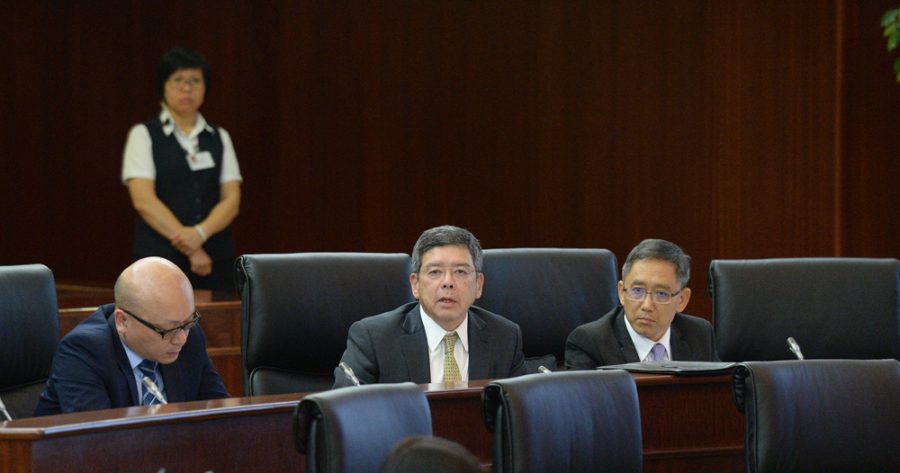The Legislative Assembly (AL) Tuesday passed the outline of a government-initiated bill regulating the future operation of the Light Rail Transit (LRT) system, which proposes that passengers violating LRT rules will face a fine of up to 10,000 patacas.
Secretary for Transport and Public Works Raimundo do Rosario introduced the outline of the bill during a plenary session in the legislature’s hemicycle.
The bill lists a raft of obligations for the operator of the LRT system, LRT passengers and other members of the public.
The bill lists 14 “don’ts” for passengers and other members of the public using the facilities of the LRT system: 1) opening train doors or platform screen doors without permission; 2) damaging LRT stations or trains; 3) dirtying stations or trains; 4) disturbing other passengers, particularly by being noisy; 5) obstructing passengers going through ticket gates, using ticket machines or escalators; 6) advertising in the area of the LRT system or distributing pamphlets or other publications without permission by the LRT operator; 7) engaging in gainful activities without the LRT operator’s permission; 8) fundraising, collecting signatures or conducting surveys without the LRT operator’s permission; 9) lying down in LRT stations or trains (except for health reasons); 10) eating and drinking on the train; 11) travelling with animals except guide dogs; 12) travelling without a valid ticket; 13) obstructing passengers getting off the train when getting onto the train; 14) smoking in LRT stations or trains.
Among the 14 “don’ts”, the bill proposes that those violating the first rule (opening train doors) will face a fine of between 2,000 patacas and 10,000 patacas, while those who breach the sixth (advertising) and seventh rules (gainful activities) will be fined between 1,000 patacas and 8,000 patacas.
The bill does not mention the amount of the fine for violating the second rule (damaging LRT stations or trains).
According to the bill, those found smoking in LRT stations or trains will be fined 1,500 patacas – the same as the fine for smoking in any of the city’s no-smoking areas listed in the existing anti-smoking law, while those who violate the remaining rules among the 14 “don’ts” will face a fine of between 500 patacas and 5,000 patacas.
In addition to the 14 “don’ts”, the bill also proposes that passengers must not threaten the safety of the LRT operation, such as by carrying hazardous items (explosives, inflammables, toxics, radioactive materials or corrosives), throwing objects at trains or onto the tracks, or activating emergency or safety devices except for reasonable circumstances. Violators will face a fine of between 2,000 patacas and 10,000 patacas, according to the bill.
The bill also proposes that in the case of an accident the LRT operator must immediately report it to the Transport Bureau (DSAT). The LRT operator is required to submit a written report to the bureau within 72 hours of the accident detailing how it occurred.
The bill proposes that the Transport Bureau is required to publish an investigative report on an accident within one year of its occurrence detailing the causes and suggestions for the prevention of the same kind of accident.
The bill also proposes five categories of criminal offences concerning the LRT operation: 1) hijacking a train; 2) endangering the safety of the LRT operation; 3) controlling the driverless train (from the operations control centre) in a way endangering the passengers; 4) throwing objects at a moving train; 5) dereliction of duty by staff members.
The bill proposes that those hijacking a train will face a prison term of between five and 15 years. Those who commit the other four criminal offences will face a prison term of between six months and 10 years, according to the bill.
The LRT operator failing to comply with the obligations listed in the bill will face a fine of up to two million patacas, according to the bill.
The government has repeatedly reaffirmed that the LRT Taipa section is scheduled to be operational next year. The Taipa section, which includes Cotai, is 9.3 kilometres long and will have 11 stations.
According to the Macau Post Daily today , during the plenary session, several lawmakers asked the government about the fares of the future LRT operation. Rosario said that the government has not yet made up its mind.
Rosario said that residents will surely not accept a fare of up to 20 or 30 patacas for a trip. He said that in most of the light rail systems in the world, the operators incur losses.
Rosario said that the MTR Corporation Limited in Hong Kong is among the world’s few railway operators that are making a profit.
He said that the MTR in profitable due to the fact that it is granted property developments above its stations by the Hong Kong government. Otherwise, the MTR might not have been able to make a profit, he said.
A total of 30 lawmakers voted in favour of the bill, while directly-elected non-establishment legislator Ng Kuok Cheong voted against the bill. Fellow directly-elected non-establishment lawmaker Au Kam San was absent.
The president of the 33-member legislature, Ho Iat Seng, did not vote as it is customarily. Non-establishment lawmaker Sulu Sou Ka Hou voted in favour.
Ng said that while the LRT law is necessary for the railway system’s operation, he voted against the bill as he needed to express his stance that there are many problems affecting the construction of the LRT system, adding it could be expected that the government would need to use a huge amount of money to operate the Taipa section every year.
Ng also said he doubted whether the LRT system would be able to improve traffic in Taipa.
The veteran lawmaker has called for a special committee of the legislature to monitor the troubled LRT project.
Apart from the Barra LRT station, construction of the other segments of the elevated railway system on the Macau peninsula have still to get off the ground.
The government has promised that the Taipa/Cotai LRT section will not cost more than 11 billion patacas. Rosario said Tuesday that the government had already spent almost 10 billion patacas on the project.






